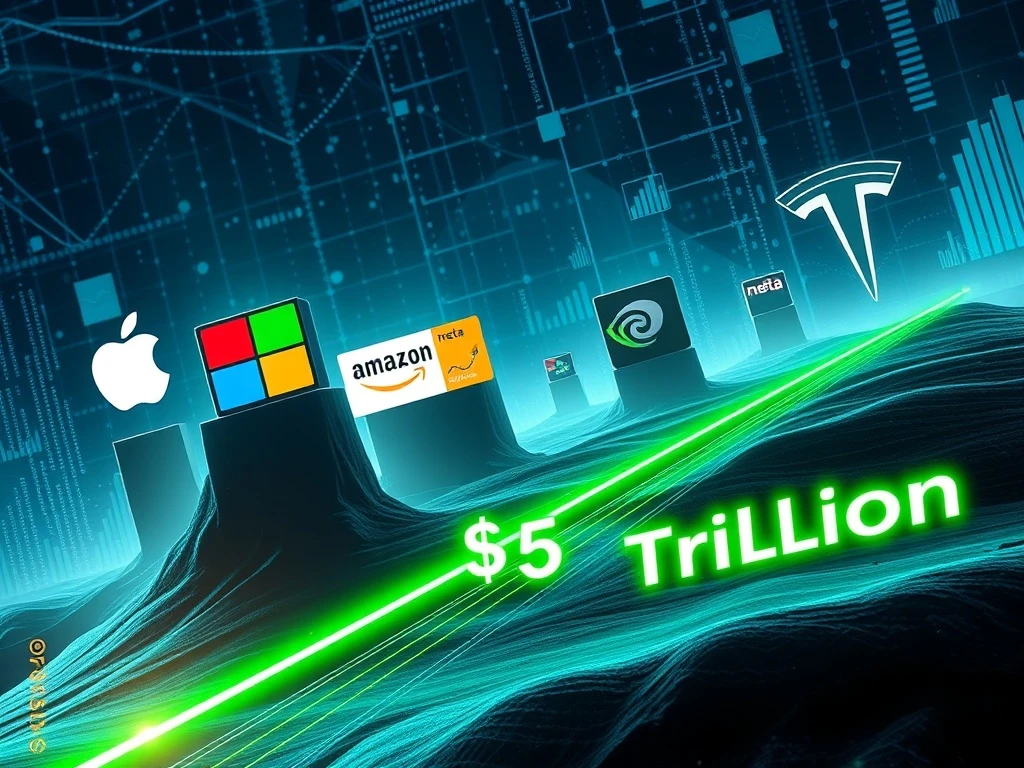The technology sector consistently captures global attention. Investors and analysts frequently monitor the performance of leading tech stock giants. A significant milestone, the $5 trillion valuation, remains a compelling target for many of these corporations. While Nvidia has recently experienced remarkable growth, other formidable players are also on a trajectory that could see them reach this unprecedented market capitalization. This article explores the potential contenders and their pathways to becoming a $5 trillion company, possibly even surpassing Nvidia in this race.
Understanding the $5 Trillion Threshold for Tech Stock Giants
Reaching a $5 trillion market capitalization signifies extraordinary growth and market dominance. This valuation represents the total value of a company’s outstanding shares. It reflects investor confidence in future earnings and strategic direction. Historically, only a handful of companies have approached such figures. The journey to $5 trillion requires sustained innovation, global market penetration, and consistent revenue growth. Moreover, companies must demonstrate resilience against economic downturns and competitive pressures. Achieving this milestone would place a company among the most valuable entities ever to exist.
Several factors contribute to this monumental growth:
- Market Expansion: Entering new geographical markets or creating entirely new product categories.
- Technological Innovation: Developing disruptive technologies that reshape industries, such as AI or quantum computing.
- Ecosystem Dominance: Building a comprehensive ecosystem of products and services that lock in customers.
- Strategic Acquisitions: Acquiring smaller companies to expand capabilities and market share.
- Strong Financial Performance: Consistently increasing revenues, profits, and free cash flow.
Furthermore, investor sentiment and macroeconomic conditions play crucial roles. Positive market outlooks often fuel higher valuations for tech stock giants. Conversely, economic uncertainty can temper growth expectations.
Nvidia’s Ascent and the Competitive Landscape for Tech Stock Giants
Nvidia’s recent surge has been nothing short of spectacular. Its leadership in artificial intelligence (AI) chips has propelled its market capitalization to unprecedented levels. This company provides the foundational hardware for many AI advancements. Consequently, demand for its products has skyrocketed. Nvidia’s GPUs are essential for training complex AI models. This strong position has made it a benchmark for rapid growth in the tech sector.
However, the tech landscape is dynamic. Many other tech stock giants possess significant advantages. They have diversified revenue streams, established global brands, and vast customer bases. These companies are also heavily investing in AI and other emerging technologies. The race to $5 trillion is not a sprint; it is a marathon. It involves continuous innovation, strategic foresight, and disciplined execution. Therefore, while Nvidia holds a strong lead in one specific segment, other companies are building momentum across various fronts. This creates a fascinating competitive environment for the top spot.
Microsoft: A Software and Cloud Powerhouse
Microsoft stands as a formidable contender in the race to $5 trillion. Its diverse portfolio spans enterprise software, cloud computing, gaming, and professional networking. Azure, Microsoft’s cloud platform, continues to capture significant market share. It competes directly with Amazon Web Services. This robust cloud business provides a stable and growing revenue stream. Moreover, Microsoft’s Windows operating system and Office suite remain industry standards. Billions of users worldwide rely on these products daily.
The company has also made strategic moves into artificial intelligence. Investments in OpenAI underscore its commitment to AI integration across all its products. This includes Copilot, an AI assistant for its Office applications. Microsoft’s strong balance sheet enables further acquisitions and research. Furthermore, its enterprise focus provides recurring revenue. This makes its growth trajectory highly predictable. Analysts often cite Microsoft’s leadership in hybrid cloud solutions as a key differentiator. The company consistently adapts to evolving market demands. This adaptability positions it well for long-term expansion among tech stock giants.
Apple: The Ecosystem King
Apple’s path to $5 trillion is paved by its unparalleled ecosystem and brand loyalty. The iPhone remains its flagship product, driving massive sales volumes. However, Apple’s services division is increasingly important. This segment includes the App Store, Apple Music, iCloud, and Apple Pay. Services provide high-margin, recurring revenue. This diversification reduces reliance on hardware sales cycles. Apple’s wearables, like the Apple Watch and AirPods, also contribute significantly to its ecosystem. These products expand its reach into new consumer segments.
The company consistently innovates in hardware and software. Its focus on user experience and privacy resonates strongly with consumers. Apple also controls its supply chain, offering a distinct advantage. Furthermore, its global retail presence and marketing prowess are unmatched. The potential for new product categories, such as augmented reality devices, could unlock substantial future growth. This makes Apple a strong candidate to achieve a $5 trillion valuation. Its brand power and customer retention are key assets for this tech stock giant.
Amazon: E-commerce and Cloud Dominance
Amazon’s dual engines of e-commerce and cloud computing position it strongly for future growth. Amazon Web Services (AWS) is the undisputed leader in cloud infrastructure. AWS provides critical services to millions of businesses worldwide. Its profitability significantly contributes to Amazon’s overall earnings. On the e-commerce front, Amazon continues to expand its global reach. It invests heavily in logistics and fulfillment. This ensures rapid delivery and customer satisfaction.
The company also diversifies into advertising, healthcare, and entertainment. Amazon Prime membership locks in customers. It offers various benefits, including streaming video and music. These complementary services enhance customer loyalty. Amazon’s relentless focus on customer experience drives its innovation. Furthermore, its ventures into AI and robotics are shaping the future of retail and logistics. The sheer scale of its operations provides a significant competitive moat. This solidifies Amazon’s position as a premier tech stock giant aiming for the top tier.
Alphabet (Google): The Information Gatekeeper
Alphabet, Google’s parent company, controls vast swathes of the internet. Its search engine remains the primary gateway to online information. Google’s advertising business generates immense revenue. YouTube, its video platform, dominates online video consumption. Android, its mobile operating system, powers billions of smartphones globally. These core assets provide a strong foundation for continued growth. Alphabet also invests heavily in emerging technologies. This includes Waymo (self-driving cars) and DeepMind (AI research). These long-term bets could unlock significant value.
Google Cloud is also growing rapidly, challenging AWS and Azure. It provides cloud services to enterprises. The company’s AI capabilities are integrated across all its products. This enhances user experience and advertiser effectiveness. Alphabet’s ability to monetize vast amounts of data is a key strength. Furthermore, its global reach and diverse product portfolio make it resilient. These factors position Alphabet as a powerful contender among tech stock giants for a $5 trillion valuation. Its constant innovation keeps it at the forefront of the digital economy.
Meta Platforms: Reimagining Social Connection
Meta Platforms, formerly Facebook, is undergoing a significant transformation. Its core social media platforms (Facebook, Instagram, WhatsApp) boast billions of users. These platforms continue to generate substantial advertising revenue. However, Meta’s long-term vision centers on the metaverse. This involves building immersive virtual worlds and augmented reality experiences. Investments in this area are substantial. They represent a bold bet on the future of digital interaction.
While the metaverse is still nascent, Meta’s leadership in this space is clear. Its VR headsets, like the Quest series, are market leaders. The company also continues to innovate its AI capabilities. This enhances content recommendation and user engagement. Meta’s vast user base provides a powerful network effect. This makes its platforms highly sticky. Furthermore, its advertising technology is highly sophisticated. This allows precise targeting for businesses. Meta’s ability to adapt and redefine social connection positions it as a potential $5 trillion tech stock giant. Its commitment to the metaverse could unlock unprecedented growth.
Tesla: Driving the Future of Transportation and Energy
Tesla has revolutionized the automotive industry with its electric vehicles (EVs). Its pioneering work in battery technology and autonomous driving sets it apart. Tesla’s brand commands significant loyalty. Its direct-to-consumer sales model also offers a unique advantage. Beyond vehicles, Tesla’s energy division is gaining traction. This includes solar panels and battery storage solutions. These products address the growing demand for sustainable energy.
The company’s software capabilities are a major differentiator. Over-the-air updates continuously improve vehicle performance and features. Tesla’s Supercharger network provides a crucial infrastructure advantage. Furthermore, its Gigafactories demonstrate efficient manufacturing at scale. The potential for robotaxis and full self-driving technology could unlock enormous future revenue streams. This vision positions Tesla as more than just an automaker. It is a technology company with massive potential in transportation and energy. Therefore, Tesla remains a strong contender among tech stock giants eyeing the $5 trillion mark.
Oracle: Enterprise Software and Cloud Evolution
Oracle, a long-standing tech stock giant, has successfully transitioned to cloud computing. Its enterprise software solutions are critical for countless businesses globally. Oracle Database remains an industry standard. The company’s aggressive move into cloud infrastructure (Oracle Cloud Infrastructure or OCI) has paid off. OCI offers competitive pricing and performance. It attracts new customers, including large enterprises. This cloud pivot provides recurring revenue and expands its market reach.
Oracle’s acquisition strategy has also strengthened its position. The acquisition of Cerner significantly boosted its presence in healthcare technology. This provides a massive new growth avenue. The company’s focus on mission-critical applications ensures high customer retention. Furthermore, Oracle continues to invest in AI and machine learning. These technologies enhance its database and cloud offerings. Oracle’s robust customer base and strategic cloud expansion make it a dark horse candidate for a $5 trillion valuation. Its foundational role in enterprise IT cannot be overstated.
Broadcom: The Backbone of Digital Infrastructure
Broadcom plays a crucial role in the digital infrastructure that powers the modern world. It designs and manufactures a wide range of semiconductor products. These components are essential for data centers, networking, broadband communication, and storage. Broadcom also has a significant presence in enterprise software. Its acquisition of VMware was a strategic move. This expanded its software portfolio and cloud management capabilities. The company’s products are fundamental to the global digital economy.
Demand for its chips and software is driven by trends like AI, 5G, and cloud adoption. Broadcom’s disciplined approach to mergers and acquisitions has created a highly profitable business. Its focus on mission-critical technologies ensures stable demand. Furthermore, its strong relationships with major tech companies provide a competitive edge. Broadcom’s foundational role in infrastructure makes it less susceptible to consumer whims. This stability, combined with strategic growth, positions Broadcom as a strong contender among tech stock giants. It provides the essential building blocks for the digital future, making its path to $5 trillion plausible.
Challenges and Opportunities for Future Tech Stock Giants
The path to a $5 trillion valuation is fraught with challenges. Regulatory scrutiny is increasing globally. Governments are examining market dominance and competitive practices. Geopolitical tensions can disrupt supply chains. Economic downturns also impact consumer and enterprise spending. Intense competition within the tech sector demands constant innovation. Companies must continually adapt to new technologies and market shifts. Attracting and retaining top talent remains a critical factor. Cybersecurity threats also pose ongoing risks. These factors can impede growth and profitability.
However, significant opportunities also exist. The continued global digitalization provides a vast market for tech products and services. Emerging technologies like AI, quantum computing, and advanced biotech offer new growth avenues. Expansion into developing markets presents untapped potential. Strategic partnerships and collaborations can accelerate innovation. Furthermore, the ability to leverage data for personalized experiences enhances customer loyalty. Companies that navigate these challenges effectively will likely be the ones to reach the $5 trillion mark. Their success will depend on strategic agility and relentless focus on value creation.
Conclusion: The Race Among Tech Stock Giants Continues
The race to a $5 trillion valuation is a defining narrative in the current tech landscape. While Nvidia has demonstrated impressive growth, the competition is fierce. Companies like Microsoft, Apple, Amazon, Alphabet, Meta Platforms, Tesla, Oracle, and Broadcom each possess unique strengths. They leverage vast resources, innovative technologies, and expansive ecosystems. Their diversified business models and strategic investments position them strongly for future expansion. The journey to $5 trillion will be a testament to their adaptability, foresight, and capacity for sustained innovation. Investors will closely watch these tech stock giants as they navigate the complexities of the global economy. The next few years will undoubtedly reveal which of these powerhouses achieves this historic milestone first.
Frequently Asked Questions (FAQs) About Tech Stock Giants and Valuations
What does a $5 trillion market capitalization mean for a company?
A $5 trillion market capitalization signifies that the total value of a company’s outstanding shares has reached $5 trillion. This makes it one of the most valuable companies globally. It indicates immense investor confidence, significant market dominance, and substantial future growth potential. This valuation reflects a company’s ability to generate massive revenues and profits consistently.
How do tech stock giants achieve such high valuations?
High valuations for tech stock giants typically result from several factors. These include groundbreaking innovation, creating and dominating new markets, establishing strong global brand recognition, and building expansive customer ecosystems. Additionally, consistent financial performance, strategic acquisitions, and effective management of global supply chains contribute significantly. Investor sentiment and a favorable economic climate also play crucial roles.
Is Nvidia guaranteed to be the first to reach $5 trillion?
No, Nvidia is not guaranteed to be the first. While Nvidia has shown incredible growth due to its leadership in AI chips, other tech stock giants possess broader market reach, diversified revenue streams, and established customer bases. Companies like Microsoft, Apple, and Amazon have different growth drivers and extensive ecosystems that could propel them to this valuation, potentially even before Nvidia.
What challenges could prevent these tech stock giants from reaching $5 trillion?
Several challenges could impede these companies. Increased regulatory scrutiny, particularly concerning monopolies and data privacy, poses a significant risk. Geopolitical tensions, supply chain disruptions, and economic downturns can also impact growth. Intense competition, the need for continuous innovation, and the ability to attract top talent are also ongoing hurdles. Cybersecurity threats represent another persistent challenge.
How do services contribute to the growth of tech stock giants like Apple and Microsoft?
Services contribute significantly by providing high-margin, recurring revenue streams. For Apple, services like the App Store, Apple Music, and iCloud reduce reliance on hardware sales cycles. For Microsoft, cloud services like Azure and software subscriptions for Office 365 offer stable and predictable income. These recurring revenues enhance profitability and provide a solid foundation for continued growth and higher valuations.
What role does AI play in the future growth of these tech stock giants?
Artificial intelligence is a pivotal driver for future growth across all these tech stock giants. AI enhances product functionality, improves operational efficiency, and creates new business opportunities. Companies are integrating AI into their core offerings, from search engines and cloud platforms to consumer devices and enterprise software. AI capabilities are seen as essential for maintaining competitive advantage and unlocking new revenue streams, accelerating the path to higher valuations.
























